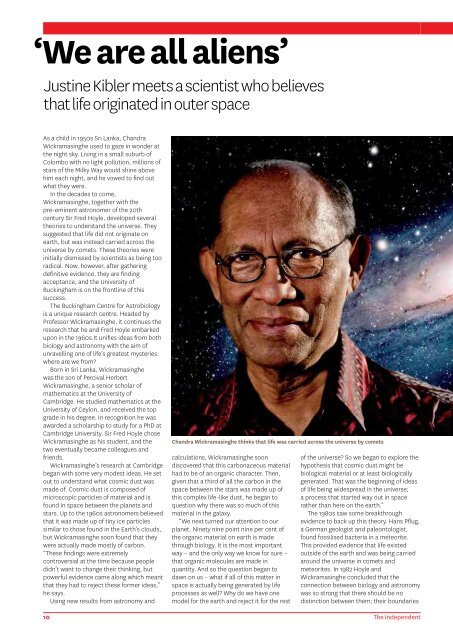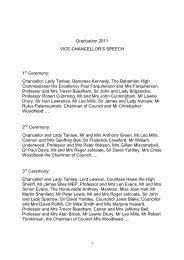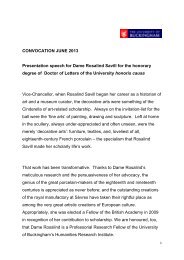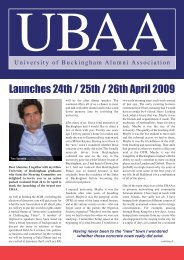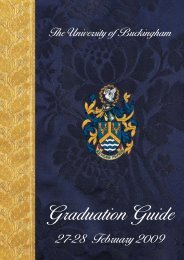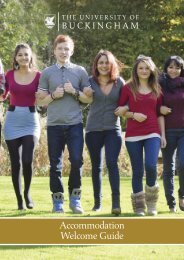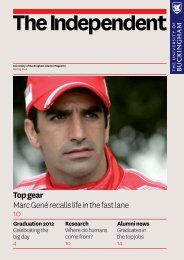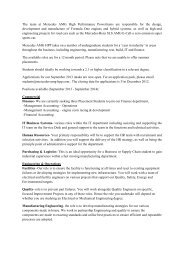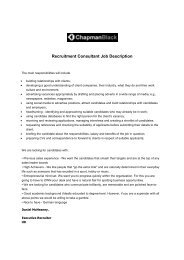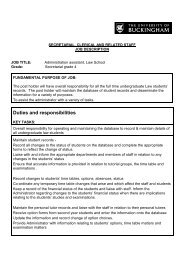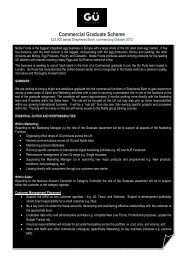Spring 2012 - University of Buckingham
Spring 2012 - University of Buckingham
Spring 2012 - University of Buckingham
Create successful ePaper yourself
Turn your PDF publications into a flip-book with our unique Google optimized e-Paper software.
‘We are all aliens’Justine Kibler meets a scientist who believesthat life originated in outer spaceAs a child in 1950s Sri Lanka, ChandraWickramasinghe used to gaze in wonder atthe night sky. Living in a small suburb <strong>of</strong>Colombo with no light pollution, millions <strong>of</strong>stars <strong>of</strong> the Milky Way would shine abovehim each night, and he vowed to find outwhat they were.In the decades to come,Wickramasinghe, together with thepre-eminent astronomer <strong>of</strong> the 20thcentury Sir Fred Hoyle, developed severaltheories to understand the universe. Theysuggested that life did not originate onearth, but was instead carried across theuniverse by comets. These theories wereinitially dismissed by scientists as being tooradical. Now, however, after gatheringdefinitive evidence, they are findingacceptance, and the <strong>University</strong> <strong>of</strong><strong>Buckingham</strong> is on the frontline <strong>of</strong> thissuccess.The <strong>Buckingham</strong> Centre for Astrobiologyis a unique research centre. Headed byPr<strong>of</strong>essor Wickramasinghe, it continues theresearch that he and Fred Hoyle embarkedupon in the 1960s.It unifies ideas from bothbiology and astronomy with the aim <strong>of</strong>unravelling one <strong>of</strong> life’s greatest mysteries:where are we from?Born in Sri Lanka, Wickramasinghewas the son <strong>of</strong> Percival HerbertWickramasinghe, a senior scholar <strong>of</strong>mathematics at the <strong>University</strong> <strong>of</strong>Cambridge. He studied mathematics at the<strong>University</strong> <strong>of</strong> Ceylon, and received the topgrade in his degree. In recognition he wasawarded a scholarship to study for a PhD atCambridge <strong>University</strong>. Sir Fred Hoyle choseWickramasinghe as his student, and thetwo eventually became colleagues andfriends.Wickramasinghe’s research at Cambridgebegan with some very modest ideas. He setout to understand what cosmic dust wasmade <strong>of</strong>. Cosmic dust is composed <strong>of</strong>microscopic particles <strong>of</strong> material and isfound in space between the planets andstars. Up to the 1960s astronomers believedthat it was made up <strong>of</strong> tiny ice particlessimilar to those found in the Earth’s clouds,but Wickramasinghe soon found that theywere actually made mostly <strong>of</strong> carbon.“These findings were extremelycontroversial at the time because peopledidn’t want to change their thinking, butpowerful evidence came along which meantthat they had to reject these former ideas,”he says.Using new results from astronomy andChandra Wickramasinghe thinks that life was carried across the universe by cometscalculations, Wickramasinghe soondiscovered that this carbonaceous materialhad to be <strong>of</strong> an organic character. Then,given that a third <strong>of</strong> all the carbon in thespace between the stars was made up <strong>of</strong>this complex life-like dust, he began toquestion why there was so much <strong>of</strong> thismaterial in the galaxy.“We next turned our attention to ourplanet. Ninety nine point nine per cent <strong>of</strong>the organic material on earth is madethrough biology. It is the most importantway – and the only way we know for sure –that organic molecules are made inquantity. And so the question began todawn on us – what if all <strong>of</strong> this matter inspace is actually being generated by lifeprocesses as well? Why do we have onemodel for the earth and reject it for the rest<strong>of</strong> the universe? So we began to explore thehypothesis that cosmic dust might bebiological material or at least biologicallygenerated. That was the beginning <strong>of</strong> ideas<strong>of</strong> life being widespread in the universe;a process that started way out in spacerather than here on the earth.”The 1980s saw some breakthroughevidence to back up this theory. Hans Pflug,a German geologist and paleontologist,found fossilised bacteria in a meteorite.This provided evidence that life existedoutside <strong>of</strong> the earth and was being carriedaround the universe in comets andmeteorites. In 1982 Hoyle andWickramasinghe concluded that theconnection between biology and astronomywas so strong that there should be nodistinction between them; their boundariesIf a really big newtheory threatensa well-establishedparadigm such as theorigin <strong>of</strong> life, therewill <strong>of</strong>ten be a greathesitation to leap oversuch a gulf in thinkingwere artificial and man-made. Fromtheir conclusion the new discipline <strong>of</strong>astrobiology arose, <strong>of</strong> which the<strong>Buckingham</strong> Centre for Astrobiologyis a descendant.Both the theory that life has beendistributed by comets and the newdiscipline <strong>of</strong> astrobiology have been slowto gain acceptance in the science world.“The majority <strong>of</strong> astronomers still find itvery uncomfortable to get to grips withthese ideas,” says Wickramasinghe.He believes that this reluctance reflectshuman nature in general. “I think humanbeings are innately conservative. We don’tlike to move house, we don’t like to changeour relationships with other people, andI think emotional stability is probably theexplanation for scientific conservatismas well. If a really big new theory threatensa well-established paradigm such as theorigin <strong>of</strong> life, there will <strong>of</strong>ten be a greathesitation to leap over such a gulf inthinking. For example it took nearly 300years, from the time <strong>of</strong> Galileo to Newton,for the old order <strong>of</strong> an Earth-centredcosmos to be rejected. It shouldn’t be thatway if science is to be entirely objective– change should be dictated by facts.Things move faster now because the pace<strong>of</strong> scientific activity has sped up a lot, butthe basic resistance to change is still there– it’s part and parcel <strong>of</strong> humanpsychology.”Evidence supporting the theory <strong>of</strong>panspermia is now mounting, however, andWickramasinghe’s once radical ideas arebecoming increasingly recognised. Inrecent years NASA astronomer RichardHoover also found evidence <strong>of</strong> fossilisedorganic material in meteorites, and otherresearchers such as Sun Kwok from the<strong>University</strong> <strong>of</strong> Hong Kong have also begun todraw similar conclusions about the life-likenature <strong>of</strong> cosmic dust.“Life is a truly cosmic phenomenon.People, and particularly astronomers, havebeen shying away from this conclusion, butit’s inevitable that their views will change,”says Wickramasinghe. “There’s no way inwhich life could have originated on earthas it is far too small a setting to make thattransformation from non-life to life. So weare all aliens, in a sense. We are all part <strong>of</strong>a connected chain <strong>of</strong> being that extendsacross the whole universe. Our biospheredoesn’t end on the surface <strong>of</strong> our earth –it extends to almost infinity.”Wickramasinghe believes the research atThe CVAge 73Education BSc in Mathematics at the<strong>University</strong> <strong>of</strong> Ceylon, PhD in Mathematicsat Cambridge <strong>University</strong>, ScD by the<strong>University</strong> <strong>of</strong> CambridgeCareer Fellow <strong>of</strong> Jesus College andDirector <strong>of</strong> Studies in Mathematics,Cambridge 1962–75, founder <strong>of</strong>Astrophysics Department in Cardiff 1975,founder <strong>of</strong> Cardiff Centre for Astrobiology2000, Director <strong>of</strong> <strong>Buckingham</strong> Centre forAstrobiology 2011 to presentHobbies Poet and authorthe new Centre will take all these ideasto their logical conclusion. “We areapproaching a point that is very criticalin the whole story <strong>of</strong> astrobiology, and it’sturning out that <strong>Buckingham</strong> will discoverthe definitive evidence, and win credit forperhaps the most important scientificrevolution <strong>of</strong> our time.”He also believes that <strong>Buckingham</strong> isthe ideal place for the new science <strong>of</strong>Astrobiology, as conceived by him andHoyle, to reside. “As an independent<strong>University</strong> it is not riddled with old ideasand prejudices, and it deserves to be inthe frontline <strong>of</strong> an important developmentlike this.”Despite the criticism he has faced overthe years, and the many questions that stillremain unanswered, Wickramasinghe looksback fondly on his career. “It has been anexciting adventure,” he says, “trying toovercome these various obstacles andtrying to solve the question <strong>of</strong> how lifebegan on the earth and how life beginsanywhere in the universe. I think I wasdriven only by a desire to know what is true– sometimes at the expense <strong>of</strong> ostracismand hostility. But in perspective all thatdoes not seem to matter so much to me.I have to admit that my research has notbrought us anywhere nearer to solving theproblem <strong>of</strong> how life began in the universe inthe first place. That’s something that is stilla very distant dream for the future – maybewe’ll never know how the first life emergedfrom non-life. What I can say with absoluteconfidence is that once life got started inthe universe as a unique event, then itsspread is inevitable, and it’s unstoppable.We humans on this planet are part <strong>of</strong> thiscosmic process.”10 The Independent The Independent 11


